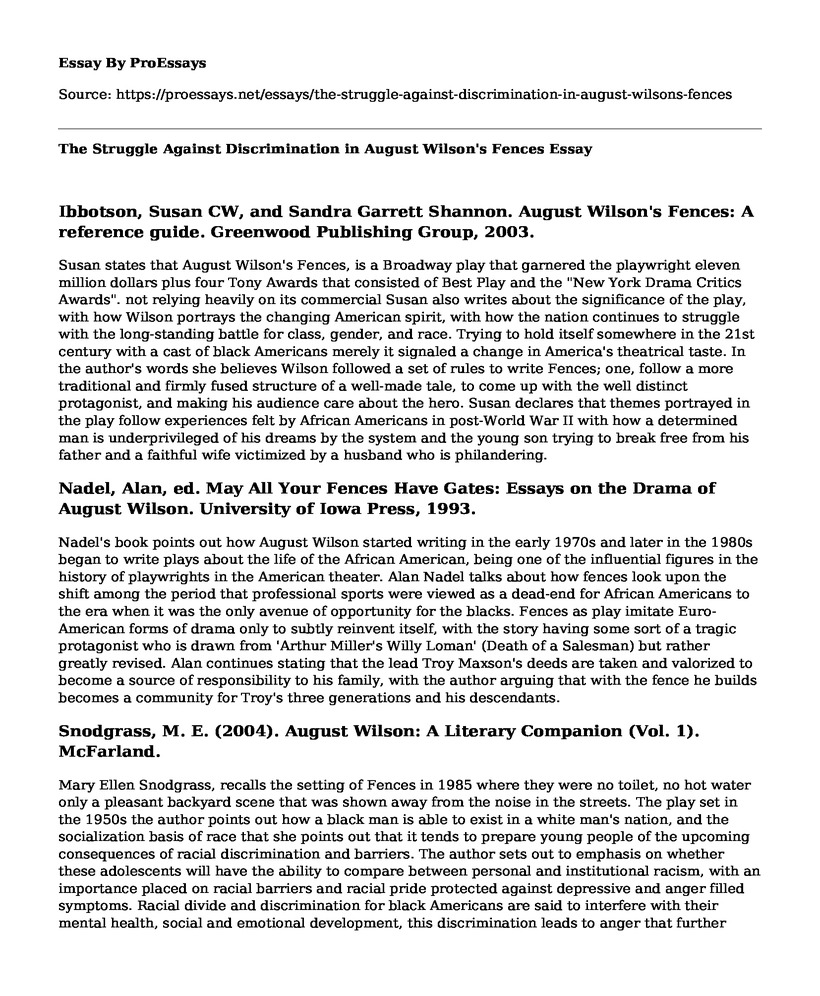Ibbotson, Susan CW, and Sandra Garrett Shannon. August Wilson's Fences: A reference guide. Greenwood Publishing Group, 2003.
Susan states that August Wilson's Fences, is a Broadway play that garnered the playwright eleven million dollars plus four Tony Awards that consisted of Best Play and the "New York Drama Critics Awards". not relying heavily on its commercial Susan also writes about the significance of the play, with how Wilson portrays the changing American spirit, with how the nation continues to struggle with the long-standing battle for class, gender, and race. Trying to hold itself somewhere in the 21st century with a cast of black Americans merely it signaled a change in America's theatrical taste. In the author's words she believes Wilson followed a set of rules to write Fences; one, follow a more traditional and firmly fused structure of a well-made tale, to come up with the well distinct protagonist, and making his audience care about the hero. Susan declares that themes portrayed in the play follow experiences felt by African Americans in post-World War II with how a determined man is underprivileged of his dreams by the system and the young son trying to break free from his father and a faithful wife victimized by a husband who is philandering.
Nadel, Alan, ed. May All Your Fences Have Gates: Essays on the Drama of August Wilson. University of Iowa Press, 1993.
Nadel's book points out how August Wilson started writing in the early 1970s and later in the 1980s began to write plays about the life of the African American, being one of the influential figures in the history of playwrights in the American theater. Alan Nadel talks about how fences look upon the shift among the period that professional sports were viewed as a dead-end for African Americans to the era when it was the only avenue of opportunity for the blacks. Fences as play imitate Euro-American forms of drama only to subtly reinvent itself, with the story having some sort of a tragic protagonist who is drawn from 'Arthur Miller's Willy Loman' (Death of a Salesman) but rather greatly revised. Alan continues stating that the lead Troy Maxson's deeds are taken and valorized to become a source of responsibility to his family, with the author arguing that with the fence he builds becomes a community for Troy's three generations and his descendants.
Snodgrass, M. E. (2004). August Wilson: A Literary Companion (Vol. 1). McFarland.
Mary Ellen Snodgrass, recalls the setting of Fences in 1985 where they were no toilet, no hot water only a pleasant backyard scene that was shown away from the noise in the streets. The play set in the 1950s the author points out how a black man is able to exist in a white man's nation, and the socialization basis of race that she points out that it tends to prepare young people of the upcoming consequences of racial discrimination and barriers. The author sets out to emphasis on whether these adolescents will have the ability to compare between personal and institutional racism, with an importance placed on racial barriers and racial pride protected against depressive and anger filled symptoms. Racial divide and discrimination for black Americans are said to interfere with their mental health, social and emotional development, this discrimination leads to anger that further leads to aggressive behavior, also associated to low self-esteem and poor academic motivation and achievement.
Cite this page
The Struggle Against Discrimination in August Wilson's Fences. (2022, Mar 28). Retrieved from https://proessays.net/essays/the-struggle-against-discrimination-in-august-wilsons-fences
If you are the original author of this essay and no longer wish to have it published on the ProEssays website, please click below to request its removal:
- Mond's Philosophy on Science Paper Example
- The Yellow Wallpaper: Suppression of Women in the 19th Century and Escape
- Lady Macbeth as a Tragic Hero in Macbeth Essay
- Compare and Contrast Essay on Translation of the Opening Lines of the Odyssey
- Critical Essays Discussing the Short Story "A Good Man is Hard to Find" by Flannery O'Connor
- Analyzing Caliban as a Tragic Hero in Shakespeare's The Tempest
- Leda's Pain: Lucille Clifton's Poetic Exploration of Abandonment - Essay Sample







